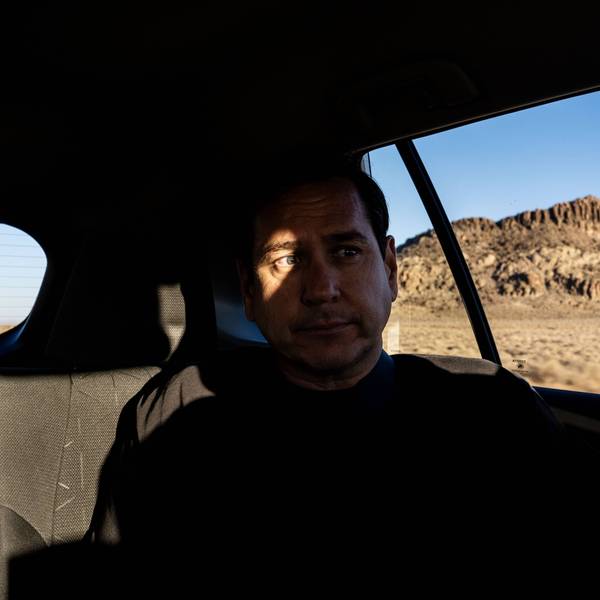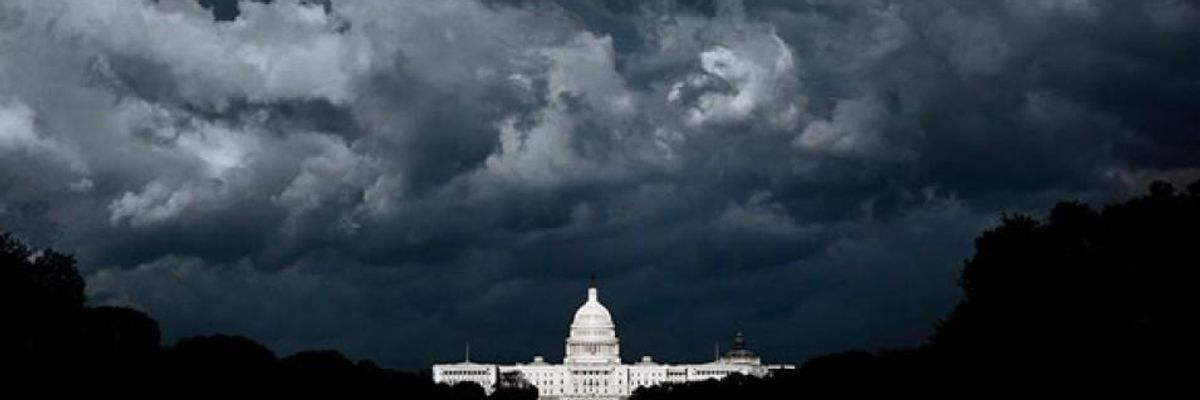The US presidential election of 2020 is now behind us--or is it? President Trump has yet to concede his defeat, and many Republican lawmakers have demanded recounts and backed lawsuits. Some commentators fear that the current administration is laying the groundwork for a coup d'etat by preventing the peaceful transfer of power, but--given the extraordinary incompetence displayed by the President and his minions during the past four years--that hardly seems to be a realistic prospect.
Trump & Co. can nevertheless salt the earth with disinformation and with resentment among the Republican voting base, making it impossible for the incoming Biden team to accomplish much. Claims of election fraudulence may prove highly effective to that end: up to 70 percent of Republicans apparently think the vote was hacked by Democrats. There's no evidence of widespread malfeasance, and Republican lawsuits related to the election are being thrown out by judges in state after state for lack of proof. Still, Trump has spent four years training his followers to regard "evidence" as something you make up on the spot to suit the needs of the moment; for the faithful, mere accusations are sufficiently convincing.
"Without social cohesion and governability, the prospects for minimizing casualties grow dim."In calm and carefree years, such nasty political infighting would just be grist for late-night comedic TV commentary. However, 2021 promises to be anything but calm and carefree. The ongoing coronavirus pandemic is now entering the most virulent stage since its onset, with over 150,000 Americans testing positive for the disease each day. The first million COVID-19 cases in the US took 100 days to accumulate; getting from 10 million to 11 million took just six days. Death counts are also rising, and hospitals are filling up. Health care workers are beyond exhausted, the nation faces a rapidly worsening nursing shortage. While effective vaccines are now on the horizon, they won't be widely available until spring at the earliest.
Meanwhile, the general public is tired of complying with masking and physical distancing orders. The holidays are looming, and people are hungry for social contact. Political polarization has seriously hampered the nation's response to the disease, with households choosing to adopt either pro-mask or anti-mask beliefs and behavior. On November 15, a member of the Trump Coronavirus Taskforce called for the people of Michigan to "rise up" against Governor Gretchen Whitmer's lockdown orders, which had been triggered by a steep increase in cases and hospitalizations. If the nation is to make it through the winter without sustaining a grievous toll, perhaps rivaling that of the 1918 influenza pandemic, it needs both leadership and social cohesion.
Is This a Depression?
Compounding the alarming pandemic risk is the specter of worsening economic conditions. Congress has so far failed to pass a renewed and expanded stimulus bill; if one isn't quickly forthcoming, the bending economy may break. Businesses--including hundreds of thousands of restaurants, hotels, bars, movie theaters, and retail outlets--that were barely holding on are now starting to give up and shutter for good. Households that are behind on mortgage and rent payments are facing foreclosure and eviction, with up to 40 million Americans at risk of homelessness in the coming months. Food banks are already overstretched. If something doesn't change, we may be headed toward a depression the likes of which hasn't been seen in nearly a century.
The Republican-dominated Senate's unwillingness to back a robust stimulus bill may be part of a longer-range political strategy. Without help from Congress, states are in desperate financial shape because, unlike the federal government, state governments (with the exception of Vermont) must balance their budgets. Since the start of the pandemic, state tax revenues have fallen off dramatically. Without a federal subsidy, states may be forced to go to court to restructure their debt--and many federal judges are now far-right Trump appointees who could demand that blue states like New York cut back on safety-net spending programs. Such cutbacks would undermine popular support for leaders of those states while bailing out wealthy bond holders, many of whom are big Republican donors. Democrats' best short-term chance at defeating this strategy would be to win control of the Senate by taking both Georgia Senate seats up for a runoff vote in January; longer-term, states may have to set up their own banks and/or issue their own currencies.
But stimulus shenanigans are merely a side show in what is shaping up to be an extended period of map-shifting political, economic, and environmental turmoil.
The Backstory
At the risk of wearying my long-time readers, it's essential that I review a bit of important context; it's what I've been writing about for the past 20 years. I'll do this as briefly as possible.
Most economists assume that GDP growth is normal and that the current pandemic-caused economic downturn will be temporary. But, as the authors of The Limits to Growth warned in 1972, no economy can expand forever. The unprecedented manufacturing booms of the 20th century came about because industrial societies had discovered new energy sources--fossil fuels--that enabled far higher rates of production than had ever been seen previously. Since 1820, both population and per-capita energy usage have grown eight-fold globally. Due in part to the fact that some of the world's best petroleum resources happened to be located in the US, Americans ended up being the top beneficiaries of the most powerful wealth-generating mechanism in human history.
But the fossil-fuel era is heading toward its inevitable conclusion. Oil, gas, and coal companies harvest fossil fuels using the low-hanging fruit principle, targeting the highest-quality and easiest-to-get resources first. After many decades of this, what's left are largely low-grade resources that require extra effort to extract or process. In effect, the wealth-generating machine is starting to run low on fuel.
Even assuming a serious effort to build out alternative (i.e., solar and wind) energy infrastructure over the next couple of decades, we are in for economic contraction--which is required in any case to prevent catastrophic climate change, resource depletion, and habitat destruction. Sadly, America's political, economic, media, and scientific elites have utterly failed to alert the masses that the rest of this century will see economic shrinkage. Without planning and preparation, uncontrolled and chaotic collapse is more likely than controlled contraction--which, in the best instance, could yield a way of life that's more localized, more equitable, and happier, at perhaps a 1950s US level of per capita consumption.
This backstory continues to evolve as fossil fuels deplete and as conditions shift in the economy and society at large. One of the less foreseeable kinds of developments during the rise and decline of the industrial era is the eruption of pandemics; and one of casualties of the COVID-19 pandemic is the oil and gas industry. In the wake of global lockdowns and the resultant cratering of tourism and the airlines, oil prices have been depressed. Fuel prices are too low to yield profits for companies that specialize in fracking, so dozens of drillers are set to go bankrupt. Climate activists will applaud. But given that what's left of America's oil and gas will be increasingly costly to extract, it's likely that declining energy demand (due to the pandemic and its lingering economic impacts) will curtail energy supply, which will further impede the economy in a self-reinforcing feedback loop that is, in some ways, a mirror image of the process that drove global growth in past decades.
Now add climate change to this toxic recipe. Even with declining rates of fossil fuel combustion, we are headed for worsening storms, droughts, floods, fires, and crop failures. Towns and cities around the world will need to adapt quickly, and that will be costly. Further, adaptation will, again, require leadership and social cohesion. Instead, America may be lurching toward further political division and violence.
Bad Timing
Ecologist Peter Turchin began his career studying beetles. After using unprecedentedly large piles of data to resolve long-standing theoretical issues regarding beetle population growth and decline, Turchin--now tenured at the University of Connecticut--decided to turn his attention to a bigger problem: human history. He teamed up with colleagues to build a database of hundreds of societies over the past 10,000 years; then he looked for patterns. One that immediately leapt out was a periodicity of growth and decline based on economic inequality: elites always tended to capture more and more of society's wealth, but that trend would typically reach a limit when the general populace became utterly impoverished. Then an "Age of Discord" would follow, when the government became destabilized and political violence increased.
Another cyclical factor that emerged from the data was what Turchin calls "overproduction of elites." As societies grow and as wealth is continually transferred toward the top of the social pyramid, ambitious families understandably prepare their children for powerful and rewarding careers. But the number of elite aspirants typically tends to grow faster than the number of elite positions in society, leading eventually to growing competition among elites. Crises of economic inequality and elite overproduction tend to coincide; at such moments, discouraged elite aspirants often present themselves as champions of the downtrodden masses in order to gain power by overthrowing the establishment.
Turchin has been warning for almost a decade that the US is, by all the measures he studies, approaching such a crisis. He says the next five years are likely to see political violence on a scale that America has not witnessed in decades.
As if on cue, groups of mostly young men appear to be prepping for bloodshed. The far right has generated an array of such groups, including The Proud Boys, The Base, Oath Keepers, The Missouri Militia, and many others, with varying priorities and strategies. Armed groups on the left appear to be far less numerous (though minorities, women, and anti-gun supporters are buying guns), the main example being Antifa, which is comprised of autonomous groups and individuals seeking to combat fascists and racists using both nonviolent and violent direct action. Each group has its favored theoreticians and tacticians. One strain of thought, known as accelerationism, has both right- and left-leaning adherents, who all believe that capitalism--with its socially and environmentally disruptive side effects--should be accelerated instead of moderated so as to precipitate industrial collapse, after which society can be reordered from scratch along lines preferable to members of whatever group happens to be prepared to take charge amid the chaos.
While a few commentators are warning that another Civil War could be looming, an organized face-off between groups of states, as occurred in the 1860s, seems highly unlikely. Political violence will more likely take the form of increasingly bloody public demonstrations phasing into episodic and regional guerilla-style attacks, reprisals, and government assertions of force.
Misinformed and Disinformed
Personally, even though I know the industrial economy we all depend upon has no future, I'm no accelerationist. Instead, I believe we should look for ways to minimize both human and non-human casualties during the inevitable period of economic decline and political turmoil ahead. That means moderating the various forms of physical power (energy usage, weaponry, resource extraction) and social power (wealth inequality, top-down coercive institutions, population growth) that have propelled us to the precipice of collapse, while finding alternative low-energy, equitable ways of fulfilling basic human needs. Democratic governance is essential to that project. Speeding up collapse might arguably reduce nonhuman casualties, but the human toll would be horrific.
Unfortunately, public support for a managed power-down is still minimal, because most people are still unaware of the nature of our collective crisis and the available options for dealing with it. Misinformation and disinformation are everywhere. Much misinformation comes from trusted sources--the mainstream media and various political, scientific, and economic elites trotted out as experts. The centrist, establishment media--including The New York Times, The Washington Post, Wall Street Journal, CNN, and the broadcast networks--are making increasing effort to discuss climate change, but they still generally fail to help readers and viewers understand the links between economic growth and environmental breakdown; instead, we are all encouraged to believe that the economy can continue to grow forever while technological miracles somehow rescue the polar bears.
Then there's deliberate disinformation--which is being raised to a high art. Was the coronavirus deliberately created as a bio-weapon? Is the pandemic a hoax? Do Democratic politicians keep young children as sex slaves and harvest their organs? Did Vladimir Putin place Donald Trump in office so as to undermine the United States politically and economically? Are the oil companies suppressing free-energy technologies? Do vaccines cause autism? Did Democrats steal the recent election by hacking Dominion voting machines? If you spend a lot of time on social media, you could be forgiven for believing any of these things. One or two of them might even be partly true--but the relevant facts will be ignored by millions of Americans who have already been convinced by evidence-free assertions flowing freely on Facebook, Twitter, and other platforms. And for those who want evidence, there are now convincing digital ways of faking it.
We humans are inclined to believe things that we want to be true. That's always been the case; it's just our nature. But, during the past four years, we've had a full-time disinformant as President. And that has seriously corroded our collective ability to think straight. People also want to believe things that relieve them of cognitive dissonance. Even if the "answer" isn't one they like, it is appealing to have an answer, any answer, for why things are the way they are or for what should be done, rather than live with the messy ambiguity of complex issues with no simple solutions.
When those who follow mainstream media are misinformed on our most critical survival issues, and those who follow alternative media are largely disinformed, social cohesion and governability get stretched thin. And without social cohesion and governability, the prospects for minimizing casualties grow dim.
Can Governability Be Conserved?
What will the trends toward political polarization and radicalization in the US lead to? In the worst instance, a violent breakup of the federal system into competing regional polities and economies. In the best imaginable case, crisis leading to a cathartic renewal. The most likely outcome: elements of both.
Renewal, if it's to occur, might have to start with the two political parties. Both are at evolutionary dead ends. The Democratic Party was once the party of wage laborers and union members, as well as southern whites; now it is dominated by highly educated coastal elites in alliance with ethnic minorities. Republicans have long been the party of big business, but lately their leaders have learned how to appeal to the less-educated rural and evangelical populace by harping on hot-button issues like abortion and gun rights, while continuing to benefit the super-rich by cutting taxes and gutting financial and environmental regulations. Democratic voters come disproportionately from high-density communities, and Republican voters from low-density communities, with battlegrounds typically located in medium-density suburbs. Trump has been brilliant at tapping into anti-elite and anti-establishment sentiment among less-educated, economically insecure whites who have been left behind by neoliberal, globalist-oriented economic policies embraced by the Democratic Party. Neither party is equipped to reach across the divides that separate Americans, and the political system is set up to make it nearly impossible for a third party to take root.
President-elect Biden is at least making an effort toward reconciliation by promising to be a leader not just of blue states, but the United States. But a third of Americans will be unwilling to grant him the opportunity. Superficial gestures toward healing will be insufficient. Genuine social catharsis is called for, as well as something along the lines of a Rural New Deal.
This is the part of the essay where the author knowingly offers guidance toward a collectively desired outcome. In this case, that's exceedingly difficult. My guess is that, over the coming years, the nation will be shaken to its foundations. And those foundations, resting as much on genocide and slavery as on democracy and freedom, may not hold. What to do during such a time of upheaval?
I intend to hold fast to my goal of trying to minimize casualties. That requires maintaining social cohesion, which in turn means steering clear of demonization and rumor-mongering. If you share my goal, I suggest you avoid the temptation to start fires or dance on your enemies' graves. Push yourself to step out of the confirmation bias bubble we all tend to slip into, so as to hear what others are saying and why. Push yourself and others in your circles to avoid making blanket judgements about people with different political or cultural beliefs. If you're in a community where this is possible, consider hosting a People's Supper (you can even do this virtually): these have brought together 10,000 people from different backgrounds and viewpoints in more than 100 communities across the US since 2017.
Remember that we are all just frightened animals trying to survive. Help those in need. Be a good neighbor. Educate, don't disinform. And take care.




